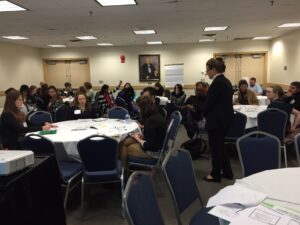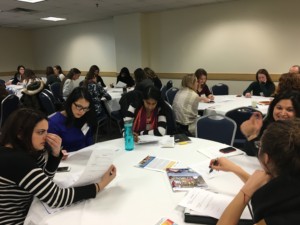WI-HER Presentation at the 2016 Global Health Mini-University
Press Release on March 9th, 2016

WI-HER, LLC Founder and President, Dr. Taroub Harb Faramand and Program Associate, Rachel Janik, presented on “Using Gender-sensitive Social and Behavior Change to Enhance Nutrition and Food Security” at the 2016 Global Health Mini-University in Washington D.C. on March 4th. The Mini-University is a day long-forum that unites global health professionals and students through presentations on a wide variety of technical areas including environmental health, family planning and reproductive health, nutrition, humanitarian relief, HIV and AIDS, infectious disease, maternal and child health, health systems, and non-communicable diseases and injury.

WI-HER’s session opened with a brief presentation on the work that was undertaken in partnership with the CORE Group, with funding from a USAID Technical and Operational Performance Support (TOPS) Microgrant Program. The purpose of the microgrant was to develop a technical resource guide and other related materials, designed to strengthen the capacity of development practitioners working in nutrition and food security to improve nutritional outcomes for mothers and children under two. Participants were introduced to nutrition and food security, and how to apply gender-sensitive SBC to the nutrition and food security contexts in order to improve nutritional outcomes for pregnant and lactating women and their children. Following the presentation, Dr. Faramand led an interactive group session, where participants worked together to integrate gender-sensitive social and behavior change (SBC) into two case studies. Participants gained hands-on experience and knowledge to apply to their own work on how to use gender-sensitive SBC approaches in program planning, implementation, monitoring and evaluation, and documentation. A lot of interest on how to best involve and engage men was generated among participants who shared the challenges that are faced in different cultures, and exchanged ideas about how best to engage men. Changing cultural norms was another topic of interest among the group. Participants expressed how important it is to conduct gender analyses, develop activities that respond to the local context, and to always disaggregate data by sex to better understand gender gaps and subsequently design activities to close them.
You can access the full technical resource guide, technical brief and webinar on our website under resources.